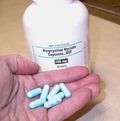 Doxycycline’s Role in the Treatment Process
Doxycycline’s Role in the Treatment Process
This also relates back to our problems with heartworm treatment.
Doxycycline kills L3 and L4 larval stages of the heartworm, and it decreases embryogenesis (the production of microscopic baby heartworms — microfilariae). It has intrinsic anti-inflammatory effects. It greatly inhibits Wohlbachia, which is a symbiotic rickettsial organism needed by Dirofilaria immitis (the canine heartworm) to survive.
When you treat with Doxycycline at 10mg/kg/day for 30 days, it will clear microfilariae and it will shrink adult worms. [Doses twice this high have been recommended, but some dogs do not tolerate the dose as well.]
We know that more inflammation is produced in the dog when worms die with Wohlbachia present, than in dogs with worms where the Wohlbachia have been suppressed with Doxycycline.
Clinically the effect is not very great in dogs that have few worms and no microfilariae. [Dogs who have been taking year-round preventive medicine, but develop a positive blood test] In dogs that have not received preventive medicine, who have more worms present, the beneficial effect is more noticeable.
It would be advisable to use Doxycyline in dogs that one suspects to have a significant worm burden and who are not in need of immediate treatment. It is combined with Ivermectin given weekly during the month of Doxycycline treatment, prior to giving Immiticide. This should eliminate microfilariae, shrink the adult worms, and reduce the amount of inflammation associated with the death of the adult worms.
Conclusion
This is not a very satisfying conclusion to my seminar, but this reflects the fact that I don’t have a good answer to my problem. I don’t know the cause of the apparent preventive medicine failures, nor why it is more difficult to eliminate adult worms and microfilariae than it used to be. I'm starting to get used to it, but I've become used to dog-bites, too, and I don't like that either.
I don’t have a strategy to improve the situation, which is why I was eager to share experiences and information with the other veterinarians and the parasitologists. I’m looking forward to seeing what the future holds here.


Thanks so much for this really detailed and informative series about heartworm!
I recently adopted a shelter dog who is heartworm-positive. She is somewhere between 5 and 9 years old (we think around 6-7) and in good health other than her infection (stage 2). She is on a 2 week round of doxycycline to prepare for her 2-shot treatment at the shelter in a few days. Lucy is an incredibly sweet dog and we are worried sick about the treatment.
My question for you is this (if you don’t mind weighing in!). The shelter prescribed the 2 week course of doxy (it sounded to me like if we had not adopted her right away, they would have skipped the doxy and started her on the treatment right away, probably for their convenience) but as far as I know did not give her any ivermectin. Does it make sense for me to push this with the shelter vets and ask for another 2 weeks of doxy + ivermectin (weekly?) before treatment? I know they won’t pay for the 3 treatment protocol for cost reasons, but I might be able to convince them to provide 2 more weeks of meds.
Is there any reason you can think of for going ahead and doing the treatment vs. waiting and medicating? Are there any significant dangers for Lucy in waiting the two weeks w/ heartworms?
I’d appreciate any thoughts you might have on the issue. Once again, great blog series!
Thank you for all the information regarding heartworm prevention and treatment. There is a lot of misunderstanding.
We are an animal welfare group who took in a dog which tested positive for heartworms. The dog has received ivermectin weekly + doxycyline daily for two weeks, paused a week, and will receive another week of doxycycline.
A few studies conclude doxycyline + ivermectin kill adult heartworm:
“Results indicate that the combination of these two drugs causes adult worm death.”
http://www.ncbi.nlm.nih.gov/pubmed/18433753
There is also internet talk of a “slow kill” method.
Do you have any advice for animal welfare groups or others with a budget that would not involve Immiticide? There are also such frequent shortages of Immiticide, it appears to be an annual event.
Thank you.